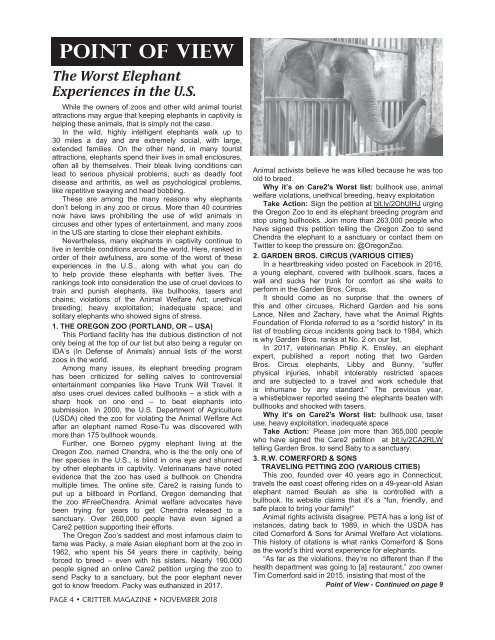You also want an ePaper? Increase the reach of your titles
YUMPU automatically turns print PDFs into web optimized ePapers that Google loves.
Point of View<br />
The Worst Elephant<br />
Experiences in the U.S.<br />
While the owners of zoos and other wild animal tourist<br />
attractions may argue that keeping elephants in captivity is<br />
helping these animals, that is simply not the case.<br />
In the wild, highly intelligent elephants walk up to<br />
30 miles a day and are extremely social, with large,<br />
extended families. On the other hand, in many tourist<br />
attractions, elephants spend their lives in small enclosures,<br />
often all by themselves. Their bleak living conditions can<br />
lead to serious physical problems, such as deadly foot<br />
disease and arthritis, as well as psychological problems,<br />
like repetitive swaying and head bobbing.<br />
These are among the many reasons why elephants<br />
don’t belong in any zoo or circus. More than 40 countries<br />
now have laws prohibiting the use of wild animals in<br />
circuses and other types of entertainment, and many zoos<br />
in the US are starting to close their elephant exhibits.<br />
Nevertheless, many elephants in captivity continue to<br />
live in terrible conditions around the world. Here, ranked in<br />
order of their awfulness, are some of the worst of these<br />
experiences in the U.S., along with what you can do<br />
to help provide these elephants with better lives. The<br />
rankings took into consideration the use of cruel devices to<br />
train and punish elephants, like bullhooks, tasers and<br />
chains; violations of the Animal Welfare Act; unethical<br />
breeding; heavy exploitation; inadequate space; and<br />
solitary elephants who showed signs of stress.<br />
1. THE OREGON ZOO (PORTLAND, OR – USA)<br />
This Portland facility has the dubious distinction of not<br />
only being at the top of our list but also being a regular on<br />
IDA’s (In Defense of Animals) annual lists of the worst<br />
zoos in the world.<br />
Among many issues, its elephant breeding program<br />
has been criticized for selling calves to controversial<br />
entertainment companies like Have Trunk Will Travel. It<br />
also uses cruel devices called bullhooks – a stick with a<br />
sharp hook on one end – to beat elephants into<br />
submission. In 2000, the U.S. Department of Agriculture<br />
(USDA) cited the zoo for violating the Animal Welfare Act<br />
after an elephant named Rose-Tu was discovered with<br />
more than 175 bullhook wounds.<br />
Further, one Borneo pygmy elephant living at the<br />
Oregon Zoo, named Chendra, who is the the only one of<br />
her species in the U.S., is blind in one eye and shunned<br />
by other elephants in captivity. Veterinarians have noted<br />
evidence that the zoo has used a bullhook on Chendra<br />
multiple times. The online site, Care2 is raising funds to<br />
put up a billboard in Portland, Oregon demanding that<br />
the zoo #FreeChendra. Animal welfare advocates have<br />
been trying for years to get Chendra released to a<br />
sanctuary. Over 260,000 people have even signed a<br />
Care2 petition supporting their efforts.<br />
The Oregon Zoo’s saddest and most infamous claim to<br />
fame was Packy, a male Asian elephant born at the zoo in<br />
1962, who spent his 54 years there in captivity, being<br />
forced to breed – even with his sisters. Nearly 190,000<br />
people signed an online Care2 petition urging the zoo to<br />
send Packy to a sanctuary, but the poor elephant never<br />
got to know freedom. Packy was euthanized in 2017.<br />
PAGE 4 • <strong>CRITTER</strong> MAGAZINE • NOVEMBER 2018<br />
Animal activists believe he was killed because he was too<br />
old to breed.<br />
Why it’s on Care2′s Worst list: bullhook use, animal<br />
welfare violations, unethical breeding, heavy exploitation<br />
Take Action: Sign the petition at bit.ly/2OhUlHJ urging<br />
the Oregon Zoo to end its elephant breeding program and<br />
stop using bullhooks. Join more than 263,000 people who<br />
have signed this petition telling the Oregon Zoo to send<br />
Chendra the elephant to a sanctuary or contact them on<br />
Twitter to keep the pressure on: @OregonZoo.<br />
2. GARDEN BROS. CIRCUS (VARIOUS CITIES)<br />
In a heartbreaking video posted on Facebook in 2016,<br />
a young elephant, covered with bullhook scars, faces a<br />
wall and sucks her trunk for comfort as she waits to<br />
perform in the Garden Bros. Circus.<br />
It should come as no surprise that the owners of<br />
this and other circuses, Richard Garden and his sons<br />
Lance, Niles and Zachary, have what the Animal Rights<br />
Foundation of Florida referred to as a “sordid history” in its<br />
list of troubling circus incidents going back to 1984, which<br />
is why Garden Bros. ranks at No. 2 on our list.<br />
In 2017, veterinarian Philip K. Ensley, an elephant<br />
expert, published a report noting that two Garden<br />
Bros. Circus elephants, Libby and Bunny, “suffer<br />
physical injuries, inhabit intolerably restricted spaces<br />
and are subjected to a travel and work schedule that<br />
is inhumane by any standard.” The previous year,<br />
a whistleblower reported seeing the elephants beaten with<br />
bullhooks and shocked with tasers.<br />
Why it’s on Care2′s Worst list: bullhook use, taser<br />
use, heavy exploitation, inadequate space<br />
Take Action: Please join more than 365,000 people<br />
who have signed the Care2 petition at bit.ly/2CA2RLW<br />
telling Garden Bros. to send Baby to a sanctuary.<br />
3. R.W. COMERFORD & SONS<br />
TRAVELING PETTING ZOO (VARIOUS CITIES)<br />
This zoo, founded over 40 years ago in Connecticut,<br />
travels the east coast offering rides on a 49-year-old Asian<br />
elephant named Beulah as she is controlled with a<br />
bullhook. Its website claims that it’s a “fun, friendly, and<br />
safe place to bring your family!”<br />
Animal rights activists disagree. PETA has a long list of<br />
instances, dating back to 1989, in which the USDA has<br />
cited Comerford & Sons for Animal Welfare Act violations.<br />
This history of citations is what ranks Comerford & Sons<br />
as the world’s third worst experience for elephants.<br />
“As far as the violations, they’re no different than if the<br />
health department was going to [a] restaurant,” zoo owner<br />
Tim Comerford said in 2015, insisting that most of the<br />
Point of View - Continued on page 9

















